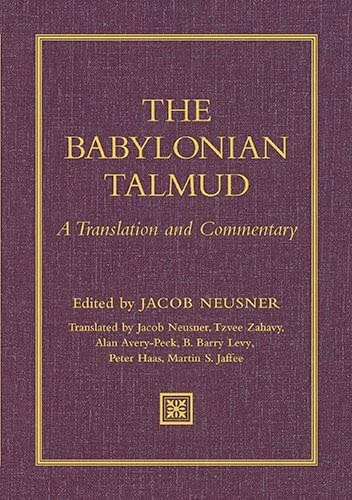
by John P. Pratt
12 Dec 2016, 1 Reed (SR)
©2016 by John P. Pratt. All rights Reserved.
| 1. The Hebrew Tradition |
| 2. Biblical Support |
| 2.1 Old Testament |
| 2.2 New Testament |
| 3. Code of Ur-Nammu |
| 4. Problem With Blasphemy |
| 5. Proposed Correction |
| 6. Conclusion |
| Notes |
There is a Hebrew tradition that after the Great Flood when God covenanted with Noah, He also gave seven laws which were to obeyed by all of his posterity. That means they were to be obeyed by all mankind living today. That is an important enough claim that it seems worth researching to discover either the truth or falsehood of that assertion. If all of us are going to be judged by our obedience to those laws, it seems imperative to know what will be on our final test. This article first reviews the tradition and then support from the Bible and from ancient laws. Finally, after concluding that there is indeed compelling evidence that such laws existed, a composite list of what those original laws might have been is proposed.
A new book attempts to bring this ancient Hebrew tradition to the notice of the Christian world. The book is entitled The Seven Laws of the Sons of Noah, by James Nollet (Oct 2016). Before reading that book this tradition was unknown to me, but it sparked enough interest to research the subject.
 |
The Talmud seems consistent in claiming that seven laws were given to Noah to be kept by all of his descendants (sometimes translated the "sons of Noah"). In this article those laws are called the "Seven Laws of Noah" or simply the "Seven Laws". Different references in the Talmud disagree on exactly what those laws were, but all agree on the number being seven.
The following are the purported Seven Laws of Noah. The order of the laws differs in different references; indeed most sources on the Internet listed them in different order. The following order is from what appears to be the earliest listing.[2] Only the single words in boldface are listed in that reference; the explanations which follow are from other sources and commentaries.
The Seven Laws
1. Courts. Have courts of law with which to administer justice. When one takes an oath to tell the truth as a witness, one may not break that oath.
2. Idolatry. Do not worship man-made images.
3. Blasphemy. Do not curse God nor use His name profanely.
4. Sexual Immorality. Do not commit adultery, incest, homosexuality, or bestiality.
5. Murder. Do not commit either homicide nor suicide.
6. Stealing. Do not steal anything which belongs to others.
7. Limb of a living animal. Do not take the limb from an animal while it lives and eat that limb. Variants of this commandment prohibit eating or drinking blood.
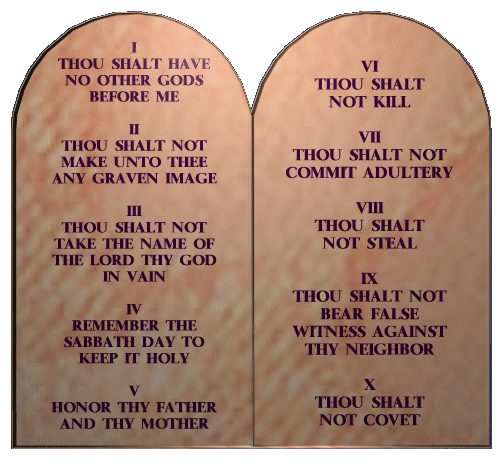 |
The Ten Commandments
1. No Other Gods. Thou shalt have no other gods before me.
2. Idolatry. Thou shalt not make unto thee any graven image, or ... bow down thyself to them.
3. Blasphemy. Thou shalt not take the name of the Lord thy God in vain.
4. Sabbath. Remember the sabbath day to keep it holy.
5. Parents. Honor thy father and thy mother.
6. Murder. Thou shalt not kill.
7. Adultery. Thou shalt not commit adultery.
8. Stealing. Thou shalt not steal.
9. Witnessing. Thou shalt not bear false witness against thy neighbor.
10. Coveting. Thou shalt not covet. (Exo. 20:3-17)
Let's compare the two lists. First, note that the first of the Seven Laws is essentially equivalent to the ninth of the Ten Commandments because both are about not lying as a witness (as in a court). If so, then we see that six of the Seven are included in the Ten. The main differences are that the Seven include a prohibition against consuming living blood and the Ten include some additional commandments.
Such similarities are to be expected because the Ten should be built on the foundation of the Seven, adding some new commandments which apply only to the descendants of Israel (Jacob). That is, after the Flood many of the descendants of Noah each founded new nations. Originally, nations were simply extended families. Each nation could enact its own laws as long as those laws stayed within the guidelines of those given to Noah for all mankind. In particular, the nation of Israel, born when the Lord through Moses delivered them from bondage in Egypt, was given the law of Moses. The Ten Commandments were a summary of that law, but were only intended to be binding on Israel. Thus we would expect the Ten Commandments to be an extension of any laws given to Noah.
As an example of a special commandment just for Israel, the sabbath (seventh) day helps Hebrews stand out as a nation and helps identify when they are being faithful in obeying the Lord. It was clearly not a commandment to all mankind. For Christians the weekly day of worship is to be Sunday, the first day of the week, in remembrance of the resurrection of Jesus Christ.[3]
As for the consuming of blood, even though such was not forbidden in the Ten Commandments, that prohibition was included elsewhere in the law of Moses: "No soul of you shall eat blood, neither shall any stranger that sojourneth among you eat blood" (Lev.17:12). Thus all of the traditional Seven Laws are included in the law of Moses.
Now let us turn to other sources to see if there any reason to believe that seven laws were actually given to Noah. Let us begin with the Bible.
.jpg) |
One law given to Noah was "But flesh with the life thereof, which is the blood thereof, shall ye not eat." (Gen. 9:4) That is an exact match for one interpretation of the seventh of the Seven Laws. It is such an unusual and unexpected law that it is a strong witness that both that Biblical law and the Talmudic tradition have a common origin.
Another law recorded in the Bible that was given to Noah is "Whoso sheddeth man's blood, by man shall his blood be shed: for in the image of God made he man" (Gen. 9:6). This is not only an exact match with one of the Seven Laws as well as one of the Ten Commandments, it also specifies the penalty as being capital punishment. Thus, any country which has laws not requiring the death penalty for murder is breaking a law given by the Lord to Noah. This law is not dependent on Hebrew oral tradition, but is stated right in the Book of Genesis.
It should also be noted that there was another law given to Noah and his sons before either of those two commandments. It has apparently been entirely overlooked in research on this subject. The first law recorded in Genesis which was given to Noah after the Deluge was: "And God blessed Noah and his sons, and said unto them, Be fruitful, and multiply, and replenish the earth" (Gen. 9:1). How can this commandment be omitted from the list when it was also given to Adam (Gen. 1:28)? Moreover, it is this verse wherein it is made clear that these commandments were intended for all of Noah's posterity. Obviously, Noah and his three sons were not being commanded to repopulate the entire earth by themselves. This omitted law is discussed below in the section proposing a restored set of the Seven Laws.
Another more subtle argument favoring the existence of idolatry being one of the Seven Laws is the following. It has always been puzzling to me that the second of the Ten Commandments was even necessary. That is, if one follows the first commandment of not worshiping any other gods except the one true God who delivered Israel from the bondage of Egypt, then wouldn't the second commandment not to worship idols be superfluous? It has always seemed that the first commandment subsumes the second if its intent was not to worship idols. The existence of the Seven Laws of Noah could help explain the reason for two separate commandments: the law forbidding idolatry was already one of the Seven, but with Moses a new commandment limiting worship even further was being added.
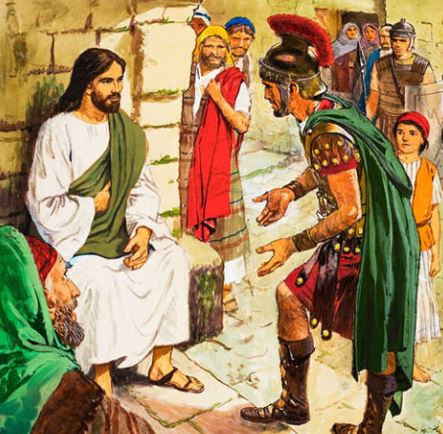 |
How did James go about deciding on that list of prohibitions? In his book, Nollet explains that to understand that ruling it helps to know that at that time there were two distinct types of converts to Judaism. The first was a full conversion which involved accepting circumcision and the entire law of Moses. The second type was simply to agree to live by the Seven Laws of Noah as then understood from the Talmud. Jews were to have no dealings at all with gentiles because they worshiped idols and many gods. If a Roman made the huge leap of faith to abandon the Roman gods to worship the one true God, then the Jews referred to that second type of convert as "God-fearing" (or as James said, "turned to God"). Jews could have interaction with God-fearing gentiles without being polluted. This must have been the case both with the Roman centurion Cornelius who "feared God" (Acts 10:1-2) as well as the centurion who not only had the faith to have Jesus heal his servant from afar but also had even built a synagogue for the Jews (Luke 7:5). James is apparently simply listing a few of the familiar laws of Noah as to what the requirements were to be a "God-fearing" gentile. If so, then his decision was that the rules for converting to Christianity could be basically the same as for that level of conversion to Judaism.
Thus, the Book of Acts provides evidence that the laws of Noah were known to the apostles of Jesus Christ and were considered to be authentic. That is a huge point of support for both the existence of such laws of Noah as well as their acceptance as having been accurately preserved by oral tradition.
If indeed seven laws for all mankind were revealed to Noah to be used for governing every nation, then some trace of those laws should be found in the most ancient laws known, especially if they trace back to near the time of Great Flood (2343 BC in my chronology).
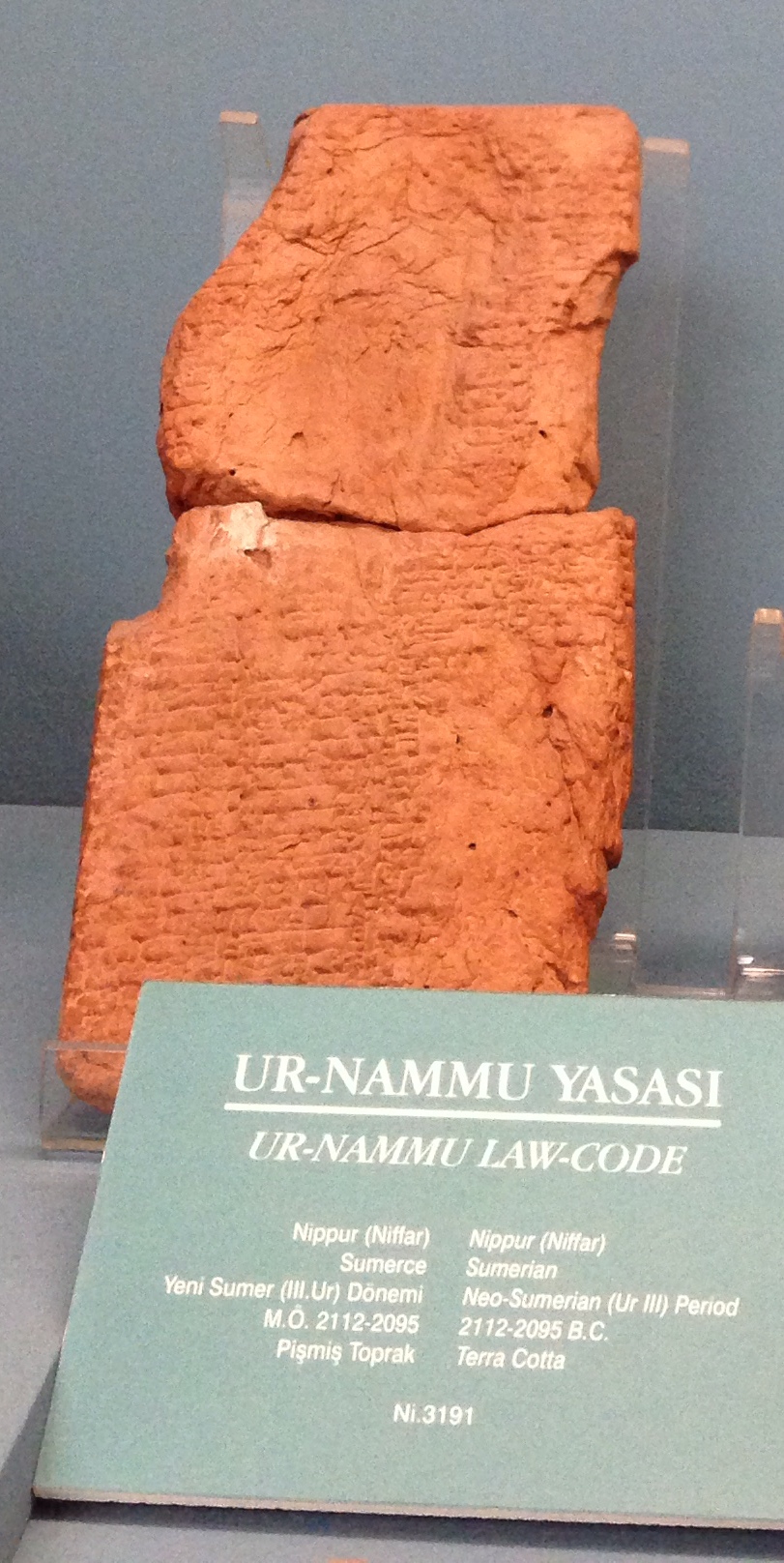 |
The first law listed is: "If a man commits a murder, that man must be killed." That one is a bull's-eye. That is almost identical to the Genesis version: "Whoso sheddeth man's blood, by man shall his blood be shed" (Gen. 9:6). In any case it seems equivalent to the fifth of the Seven Laws of Moses: Do not murder. Remember, that comparison is not to Hebrew oral tradition, but the Bible itself. On the other hand, it is not surprising that murder is against the law, so let's look at some other laws.
The second law is: "If a man commits a robbery, he will be killed". In most of these translations, "robbery" and "stealing" are used interchangeably. The technicality that in English "robbery" is different from "stealing" because it implies force on the victim or the threat of force was apparently not understood by most translators. The third law concerns kidnapping which is treated separately from theft.
Laws 4 through 11 all concern marriage, divorce, and avoiding adultery. Some instances of adultery were actually punishable by death (laws 6 and 7), just at it was in the law of Moses, so those laws show how important marriage covenants were. Forbidding adultery is not only a match to the eighth of the Ten Commandments, it is close enough to the fourth of the traditional laws of Noah as to be counted as a match.
Moreover, because marriage is implied in the forgotten law of Noah to "multiply, and replenish the earth", it is important to notice that some of the laws of Ur-Nammu deal with marriage. Thus, here we find evidence in support of marriage being considered in the official laws of the land as might be expected from what Noah was commanded.
Most of the other laws in the Code of Ur-Nammu deal with treatment of slaves and disputes between citizens. Apparently the laws covered both what we now call criminal and civil cases.
Law 28 is relevant to this study: "If a man appeared as a witness, and was shown to be a perjurer, he must pay fifteen shekels of silver". That is a very close match to both the ninth of the Ten Commandments and the first of the traditional Hebrew laws of Noah. That makes four matches, which forms good supporting evidence that ancient laws might well have been shaped by the alleged Seven Laws of Noah. Of course, it is not surprising that there were laws against murder and theft, but to sometimes punish adultery with death and to prohibit only bearing false witness rather than lying in general[5] are both unusual enough to constitute compelling evidence that there is an actual connection between the two sets of laws. Limiting lying to false witness seems wise to indicate a high level of deception intended in order to be condemned of breaking this law. Besides applying to perjury in court, this law could also include publicly making false claims about a product being sold. Not forbidding all lying gets the husband off the hook for telling his wife the "little white lie" that she does not look fat in that dress!
The better known Code of Hammurabi, a king of the Old Babylonian Kingdom near the same area as Sumer, dates to about 1700 B.C. It had 232 laws which were similar to those of Ur-Nammu, but covered many more details of social actions, such as the wages to be paid to various trades. Details are not reviewed in this article as they do not add much new to this discussion, but the preface seems relevant as it attests to the desire of the king to please God and rule in righteousness:
"Anu and Bel called by name me, Hammurabi, the exalted prince, who feared God, to bring about the rule of righteousness in the land, to destroy the wicked and the evil-doers; so that the strong should not harm the weak; so that I should rule over the black-headed people like Shamash, and enlighten the land, to further the well-being of mankind."[6]
Notwithstanding good support of the existence of Noah's Seven Laws and strong evidence of similarities found in ancient legal codes dating to that period, there appear to be problems with one of the laws given in the traditional Hebrew view. That is not surprising because they claim to have been preserved by an oral tradition. Anyone who has played the game of whispering a sentence around a circle of people in order to laugh at how much it gets changed is familiar with the possibility of details being altered or misunderstood. More than that, there is the possibility of some of the laws having been entirely lost. The most consistent part of the tradition, and one which would be easy to preserve, was that there were originally seven laws. Thus, if some were lost, then others would need to be invented to fill their slots to make a total of seven (representing completeness). Let us now look at some problems to see if remedies can be proposed.
The third of the traditional Hebrew laws which forbids blasphemy against God is problematic. If it were correct, then God would be brought into the laws of all nations. Do all nations even know about God? Let's consider the implications of accepting this law.
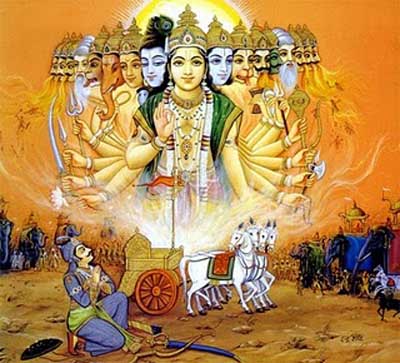 |
The Ten Commandments require the worship of God for the children of Israel, but that is an example of adding a law for one particular nation. In the Book of Mormon, there is also another example of a law requiring worship of the Lord. New prophets can make new covenants with God which not only affect their descendants but also all of those who enter the land associated with the covenant. The Book of Mormon is largely the story of the descendants of a prophet named Lehi who was a descendant of Joseph of Egypt. His family left Jerusalem in 601 BC, just before its destruction later that year,[7] and were led by the Lord across the ocean to the Americas. Lehi made a covenant with the Lord which apparently concerns the entire western hemisphere. The law which came with his covenant to receive that land included at least two new laws above and beyond the laws of Noah. First, the inhabitants of the land, including those from the gentile nations who would eventually "discover" that land, must worship the Lord Jesus Christ. The Lord has decreed that if any nation on this land ceases to be Christian, it will be swept off the face of the earth. In fact, that decree dated back to the civilization of the Jaredites who had dwelt in the land previous to Lehi, but had been destroyed (Ether 2:9).
Second, Lehi was given the law of monogamy (the marriage of one man to one woman) for all who lived in his land. The Lord told Lehi's son Jacob that He was not at all pleased with what had happened in the case of Solomon with his 700 wives and 300 concubines (1 Kings 11:3 ) and He would not tolerate anyone using Solomon as an excuse to practice polygamy in this new land (Jacob 2:24-27). Jacob was told this was the law given to Lehi, although there could be exceptions if commanded by the Lord. The Lord also added that their enemies (the Lamanites), even though wicked in many ways, at least followed the law of monogamy and hence would be used by the Lord as a scourge to them.
This law of monogamy is noted here because it was clearly a departure from what had been allowed under the Seven Laws of Noah. There are prohibitions against adultery in all three sets of laws considered (Seven Laws, Ten Commandments, and Code of Ur-Nammu). That implies that some sort of marriage must be defined, but leaves it open as to multiple wives or husbands or concubines being lawful. The new law in the Americas was definitely more restrictive.
This is a great example of how new nations could have different laws from each other, even given by the Lord, but it would be understood that all would still fall within the restrictions of Noah's Seven Laws. The main reason to include these examples from the Book of Mormon is to offer evidence that there was no requirement to believe in God nor prohibition of polygamy or concubines in the Seven Laws of Noah.
It seems worth an attempt to restore the original seven laws. We have seen that at least one has been omitted, that of multiplying to replenish the earth. Marriage is implied in all three lists of laws considered in this article because all of them prohibit adultery, which is the breaking of a marriage covenant. Thus it seems that one missing commandment might well have discussed marriage and having offspring.
Moreover, it has been argued above that there seems to be no reason to require that all mankind worship the god of Abraham. That was a special commandment for his posterity. Thus, the commandment not to blaspheme the name of God seems out of place for the many nations who had never even heard of God.
An important point here is the beauty and importance of negative laws. People often complain about the "Thou shalt not" commandments because they restrict freedom. But another way to look at it is they allow everything else except the one thing that is forbidden. Consider the example of all of the fruit in the Garden of Eden being available for Adam and Eve except for just one tree which was forbidden (Gen. 2:16-17).
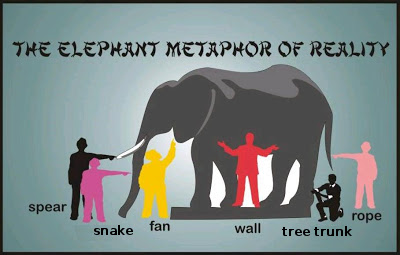 |
As another example, Taoists claim to follow "The Way", the true path of life. When Christ came, he announced "I am the way" (John 14:6). All men are born with the light of Christ (John 1:9). So in a sense, any man following his conscience, the light within him, is following Christ, but without necessarily knowing His name. That could be a religion which would lead men to lead honorable lives. Clearly, it should not be a law for all nations to have to know of God and worship Him.
With all of that in mind, just changing one of the traditional Hebrew list of the Seven Laws of Noah results in what appears to possibly be an acceptable suggestion to be the original list. That is simply to replace the prohibition on blasphemy with the Biblical commandment to multiply and replenish the earth:
Proposed Original Seven Laws
1. Idolatry. Do not worship man-made images.
2. Families. Encourage marriage for raising offspring.
3. Adultery. Do not commit adultery.
4. Blood. Do not eat nor drink blood. 5. Stealing. Do not steal.
6. Murder. Do not murder. He who sheds innocent blood shall be executed.
7. Witnessing. Do not bear false witness.
If we count witnessing the same as courts, adultery the same as illicit intercourse, and consuming blood the same as eating a limb torn off a living animal, then six of these seven match up with the traditional Hebrew list. Only the prohibition of blasphemy has been removed for reasons discussed above. It was replaced with the one to marry and multiply and replenish the earth, which in fact was in the list provided in the Bible.
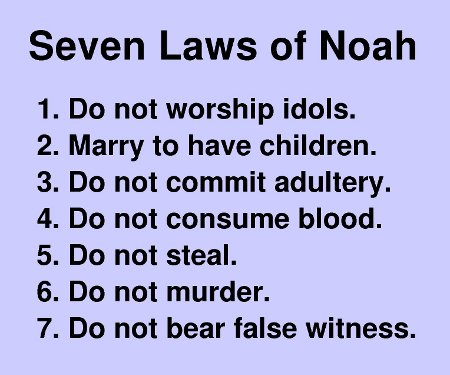 |
As for the proposed order of the Seven Laws, note that commandments 2, 4, 6 are the three commandments listed in Genesis, kept in the same order. Moreover, commandments 1, 3, 5, and 7 are all included in the Ten Commandments in that same order. In addition, sacred symbolism of the numbers is retained: 1 is about worshiping God; 2 is about marriage (of two people), 3 is about a third person outside of marriage, 4 is about life, and 6 is about murder. In most of the sacred calendars, the number 6 represents death. The prohibition of murdering is also the sixth of the Ten Commandments. Thus, the order of these proposed commandments seems to be correct, or at least meaningful.
The evidence is compelling that there were indeed seven laws given to Noah after the Great Deluge to be observed by all nations which sprang up among his descendants. Several of the seven laws traditionally accepted by Judaism coincide with laws of the Ten Commandments and also from the Code of Ur-Nammu, which are the oldest laws known in history dating back to just a few hundred years after the Flood. Examination of the traditional laws shows both that one that is recorded in Genesis has been omitted and that one was added which does not seem possible to be correct. Thus, simply replacing the incorrect one (blasphemy) with the missing one (multiply and replenish the earth) produces a proposed list for the original Seven Laws of Noah given for all mankind as commandments from God.